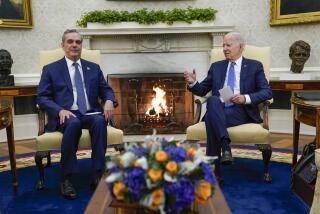Clinton Calls for Inner-City Investment
- Share via
NEW YORK — While the stock market may be booming and the economy on a roll, President Clinton told Wall Street on Thursday that the country will not realize its economic potential until that same prosperity reaches the inner cities.
“We must bring more Americans into the winner’s circle,” Clinton told an economic summit organized by the Rev. Jesse Jackson to urge more investment by big business in minority communities.
Joining some of New York’s corporate and political elite atop the towering World Trade Center, Clinton urged big business not to overlook the huge markets and employment pools present in minority communities.
“One study estimates that inner-city residents control $85 billion in purchasing power,” Clinton said. “That’s more than the entire retail market in Mexico,” he noted.
“If it’s a good argument to sell more and invest more around the world, it’s a good argument for America to sell more and invest more down the street,” said Clinton, who was joined by Labor Secretary Alexis M. Herman.
While emphasizing the private sector’s critical role in expanding opportunity, Clinton announced that his forthcoming budget proposal will include new money for empowerment zones, community development banks, housing loans and job training.
Although he provided few details--”I’ve got to save a little bit for the State of the Union,” Clinton said--aides said the budget will include $125 million for community development banks, a 56% increase aimed at providing seed money for inner-city entrepreneurs.
The lineup of financial heavyweights enlisted for the three-day conference said much for Jackson’s drawing power. Besides Clinton himself, three top economic officials are participating: Treasury Secretary Robert E. Rubin, Federal Reserve Chairman Alan Greenspan and Securities and Exchange Commission Chairman Arthur Levitt.
The top Wall Street sponsors are Richard Grasso, chairman of the New York Stock Exchange, and Sanford Weill, chairman of Travelers Group, parent of brokerage giant Salomon Smith Barney. Merrill Lynch, Goldman Sachs, Morgan Stanley, Prudential Securities and Donaldson, Lufkin & Jenrette are among the other brokerage industry co-sponsors.
Some Wall Streeters said privately that their firms signed on partly because they feared becoming targets of Jackson’s sometimes harsh brand of public lobbying.
Jackson said that, although 9% of securities industry employees are African American, the number shrinks as the job level rises. Of 90,000 stockbrokers nationwide, only 600 are black, Jackson said, citing research by Wall Street newsletter publisher Tony Chapelle.
Jackson can claim at least one victory in the year since his Chicago-based Rainbow/PUSH Coalition set up its Wall Street Project: Largely at his urging, the New York Stock Exchange will be closed for a full day Monday in observance of Martin Luther King Jr. Day. Previously, the Big Board observed the day with only a moment of silence on the trading floor.
Jackson’s push is not only for greater minority employment in the securities industry but also for more investment in minority neighborhoods and businesses. He proposed redirecting toward inner cities a portion of the huge pool of pension fund money invested through Wall Street.
Clinton’s appearance continued his months-long effort to bridge racial divisions, which he said Thursday would ultimately determine whether America becomes more like a school district with students from across the globe or more like Bosnia, Rwanda, Ireland or the Middle East, besieged by ethnic and religious divisions.
Jackson praised Clinton’s appearance, quibbling only with his later announcement of a $120-million grant to fund 1,600 more police officers in New York City. Jackson said the money would only boost the prospering “jail industrial complex” and not steer people from crime.
Clinton said he is following through on his promise to fund 100,000 new police officers across the country. More than 70,000 officers have been hired, he said.
More to Read
Sign up for Essential California
The most important California stories and recommendations in your inbox every morning.
You may occasionally receive promotional content from the Los Angeles Times.













